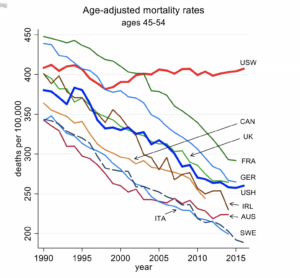
White male life expectancy is rising in the US (while falling in other developed nations) due to our weak social safety nets.
President Trump has ordered Federal Agencies and their contractors (i.e., a significant percentage of American businesses) to halt diversity training that builds from Critical Race Theory. Words you are likely familiar with – such as unconscious bias – emerge from this theory, which argues that racism is ingrained in American society’s fabric and system, not merely in individual people. This system better explains societal outcomes than does individual behavior. Business is rightfully pushing back against Trump’s order, as efforts to encourage diversity and welcoming cultures have led to more successful talent attraction and retention and more innovative cultures.
Trump’s action aims to appeal to his political base, and while it may be right politically, it is wrong on other levels. To understand, I encourage you to read Caste: The Origins of Our Discontents. In the book, Pulitzer Prize-winning author Isabel Wilkerson comments: “Caste does not explain everything in American life, but no aspect of American life can be fully understood without considering caste and embedded hierarchy.”
Wilkerson masterfully helps her audience view current and historical race tensions in the US through a Caste System lens. Most Americans learned about castes when studying India. We understand ethnic-based hierarchies by exploring Germany’s years before and during Hitler’s reign. What Wilkerson does is weave America’s racial history into the mix to help us better understand, through the lens of caste, the origins and continuation of our nation’s racial tensions. I was surprised to learn that Germany studied the US Jim Crow era to design strategies for segregating its Jewish citizens.
Let me use Wilkerson’s words to define caste. “A caste system is an artificial construction, a fixed and embedded ranking of human value that sets the presumed supremacy of one group against the presumed inferiority of other groups on the basis of ancestry and often immutable traits (e.g., race), traits that would be neutral in the abstract but are ascribed life-and-death meaning in a hierarchy favoring the dominant caste whose forebearers designed it.” Caste shapes the allocation of power, respect, and authority much as your skeleton has a massive influence on your physical appearance and capabilities. Caste leads to making assumptions about people before you even know them. In India, those in the highest caste are assumed to be the most intelligent. Some in the US see a group of Black teens or men in hoodies and feel fear. Such assumptions are called unconscious bias.
Yes, the US has made incredible strides to reduce racial unfairness, starting with a Civil War to end slavery. But unlike Germany, which has bent over backward to transform its culture away from its anti-Jewish Nazi mentality, America has not come as far. Indeed, the Jim Crow Era and policies such as past federal housing and zoning policies that sustain segregated schools and unequal PK-12 education have collectively embedded unfairness in our nation based on race. Blacks are our lowest caste or what Indians, according to Wilkerson, would call the “untouchables.”
Wilkerson makes clear that we are all hurt by caste. The lives of economically successful Blacks are no yellow brick road: they have higher blood pressure and a higher probability of being stopped by the police or viewed by others as dangerous. Out of concern about policies that might benefit Blacks, whites in lower socioeconomic classes often vote against their economic interest and have suffered not just financial but growing health consequences. Unlike other wealthy countries, white voters have not supported a more muscular social safety system. So, lose your job, or lose the dominant company in your city, and you suffer. And America loses the productivity of a significant percentage of its population. A Citibank global economist argues we’d have $26 trillion higher GDP (about double) with a less racially divisive nation.
We need the training Trump is banning. I love our nation dearly, and I, for one, will look at it differently now that I have read Wilkerson’s book, albeit with no less love. We can only hope Trump loses the November election so we can continue on our path towards pulling out the roots of our race-based caste system and advancing racial healing.
You can start, as a white person, by broadening the visual pictures you receive of Blacks and becoming more aware of your unconscious biases. Will and Grace and Glee, two TV shows with lovable leading gay characters, helped change our national view of gays. We can change our automatic assumptions about people who are not like us and try, instead, to get to know them as individuals.
